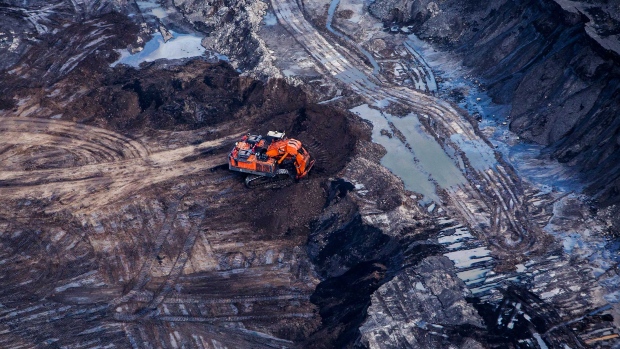Nov 7, 2018
Imperial Braves Price Slump to Build New Oil-Sands Project
, Bloomberg News

(Bloomberg) -- Imperial Oil Ltd. is going ahead with its C$2.6 billion ($2 billion) Aspen oil-sands project even as Canadian heavy crude is selling at the lowest prices in at least a decade.
The producer, which is majority-owned by Exxon Mobil Corp., said it made a final investment decision to build the so-called solvent-assisted, steam-assisted gravity drainage site in northern Alberta, and that it will produce 75,000 barrels a day of bitumen once it starts operation. Construction will start this quarter and is expected to be completed in 2022.
Aspen would be the biggest brand new oil sands project to be sanctioned since global crude prices collapsed in 2014 from more than $100 a barrel. The decision is a vote of confidence in Canada’s oil patch at a time when pipeline bottlenecks and delays in building new export lines widen the gap between local heavy-crude prices and global benchmarks.
“It demonstrates that the economic principles underpinning the oil sands remains intact,” said Kevin Birn, a director on the North American crude oil markets team at IHS Markit. “If these differentials can be resolved, there is still potential.”
Western Canadian Select fell to a $50 discount to West Texas Intermediate futures last month, the widest in Bloomberg data extending back a decade. It’s been trading near $18 a barrel, less than a third this year’s $57.99 peak in May.
The decision to go ahead with Aspen contrasts with moves by international majors such as Royal Dutch Shell Plc, ConocoPhillips and Total SA, which sold Canadian assets and reduced their exposure to the oil sands during the downturn.
But Imperial has a history of taking advantage of downturns to get cost savings, Birn said. He estimates the project’s current price represents a capital expenditure 30 to 40 percent lower than what it would have cost in 2014, when the industry was booming. Imperial Chief Executive Officer Rich Kruger echoed that view during a press conference on Wednesday.
“It’s a bit countercyclical in that there’s not a lot of investment in construction going on,” the CEO said. “So if you want the highest performance from contractors and tradesmen and safety and productivity, it’s a good time to build.’’
As for the shipping bottlenecks, Imperial has a options that include finding ways of processing more of its heavy crude at its own refineries, expanding the use of its rail terminal and placing some of the new output into Enbridge Inc.’s expanded Line 3 or other pipeline projects that are currently on the drawing board, Kruger said.
The project will use technology that could reduce greenhouse gas emissions intensity and water use by as much as 25 percent versus traditional steam-assisted technology, Imperial said. It could be expanded by another 75,000 barrels a day depending on performance and market conditions, the company said.
Shares of Imperial slipped 0.5 percent to C$41.99 at 1 p.m. in Toronto, paring their gain this year to about 7 percent.
(Adds analyst comment in fourth paragraph and CEO comment in eighth paragraph.)
To contact the reporters on this story: Robert Tuttle in Calgary at rtuttle@bloomberg.net;Kevin Orland in Calgary at korland@bloomberg.net
To contact the editors responsible for this story: David Marino at dmarino4@bloomberg.net, Carlos Caminada, Christine Buurma
©2018 Bloomberg L.P.


